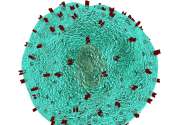An antigen is a foreign molecule that, when introduced into the body, triggers the production of an antibody by the immune system. The immune system will then kill or neutralize the antigen that is recognized as a foreign and potentially harmful invader. These invaders can be molecules such as pollen or cells such as bacteria. The term originally came from antibody generator and was a molecule that binds specifically to an antibody, but the term now also refers to any molecule or molecular fragment that can be bound by a major histocompatibility complex (MHC) and presented to a T-cell receptor. "Self" antigens are usually tolerated by the immune system; whereas "Non-self" antigens are identified as invaders and attacked by the immune system. self antigens.
An immunogen is a specific type of antigen. An immunogen is a substance that is able to provoke an adaptive immune response if injected on its own. An immunogen is able to induce an immune response, whereas an antigen is able to combine with the products of an immune response once they are made. The overlapping concepts of immunogenicity and antigenicity are, therefore, subtly different. According to a current textbook:
Immunogenicity is the ability to induce a humoral and/or cell-mediated immune response
Antigenicity is the ability to combine specifically with the final products of the immune response (i.e. secreted antibodies and/or surface receptors on T-cells). Although all molecules that have the property of immunogenicity also have the property of antigenicity, the reverse is not true."
At the molecular level, an antigen is characterized by its ability to be "bound" at the antigen-binding site of an antibody. Note also that antibodies tend to discriminate between the specific molecular structures presented on the surface of the antigen (as illustrated in the Figure). Antigens are usually proteins or polysaccharides. This includes parts (coats, capsules, cell walls, flagella, fimbrae, and toxins) of bacteria, viruses, and other microorganisms. Lipids and nucleic acids are antigenic only when combined with proteins and polysaccharides. Non-microbial exogenous (non-self) antigens can include pollen, egg white, and proteins from transplanted tissues and organs or on the surface of transfused blood cells. Vaccines are examples of immunogenic antigens intentionally administered to induce acquired immunity in the recipient.
Cells present their immunogenic-antigens to the immune system via a histocompatibility molecule. Depending on the antigen presented and the type of the histocompatibility molecule, several types of immune cells can become activated.









